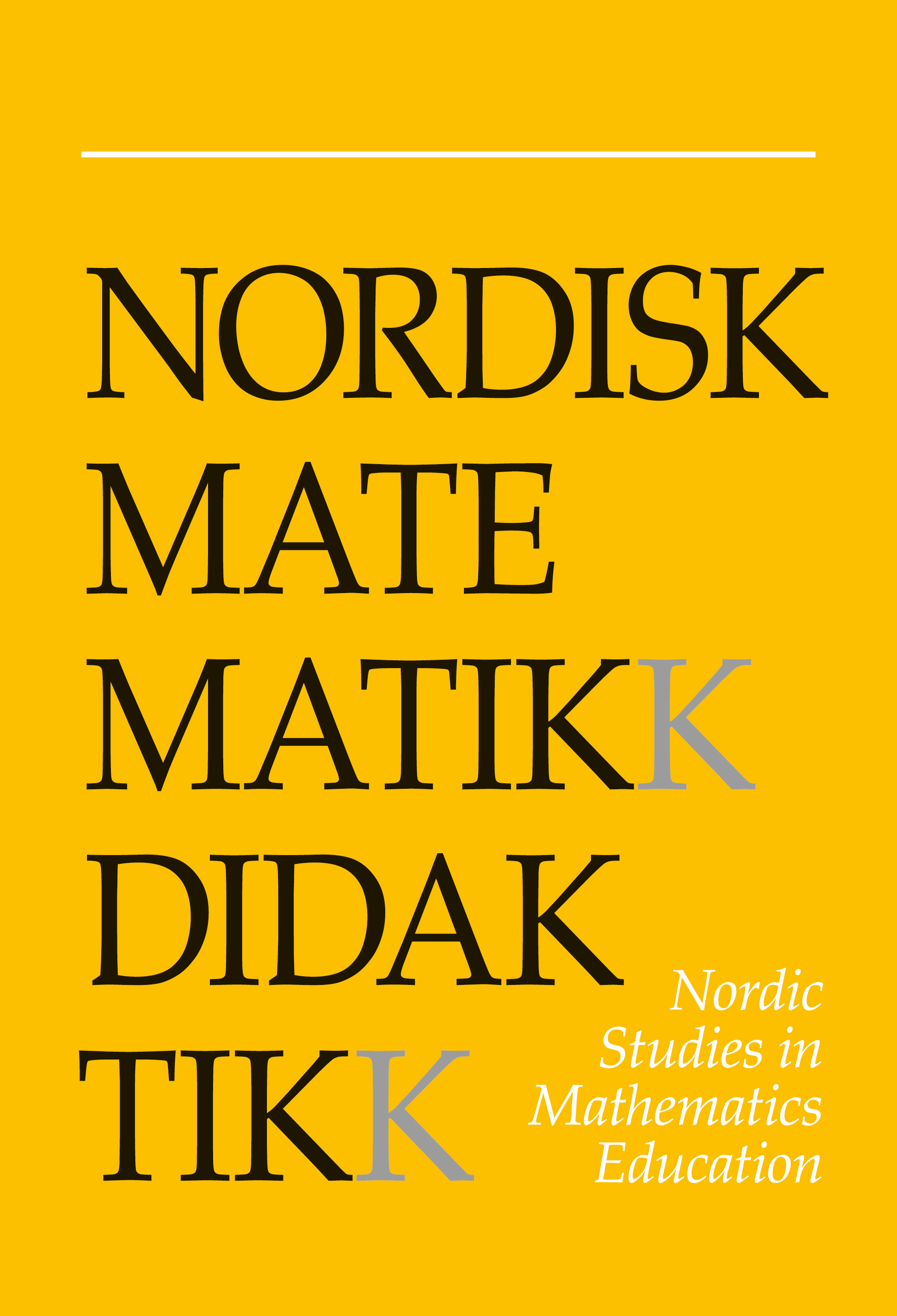Fostering mathematical reasoning in inquiry-based teaching – the role of cognitive conflicts
DOI:
https://doi.org/10.7146/nomad.v26i2.149162Abstract
Students’ independent mathematical inquiry is often endorsed as a valuable teaching method. In this article, we scrutinise in what ways these independent situations entail the students’ development of mathematical reasoning. We study the cognitive conflict in one fifth-grade class participating in an inquiry-based intervention study. The findings indicate that cognitive conflicts can support the students’ reasoning processes and that the environment has an important role in retaining the conflicting positioning by making the cognitive conflicts available for discussion and scrutiny. The students’ processes of resolving cognitive conflicts are stretched over time and involve different routes and exploring approaches and understandings.
References
Artigue, M. (2012). What is inquiry-based mathematics education (IBME)? Background resources for implementing inquiry in science and mathematics at school. In M. Artigue & P. Baptist (Eds.), Inquiry in mathematics education (pp. 3-13). Fibonacci Project.
Artigue, M. & Blomhøj, M. (2013). Conceptualizing inquiry-based education in mathematics. ZDM, 45 (6), 797-810. https://doi.org/10.1007/s11858-013-0506-6
Ball, D. L. & Bass, H. (2003). Making mathematics reasonable in school. In J. Kilpatrick, W. G. Martin & D. Schifter (Eds.), A research companion to principles and standards for school mathematics (pp. 27-44). NCTM.
Baptist, P. (2012). Towards teaching and learning inquiry-based mathematics. In M. Artigue & P. Baptist (Eds.), Inquiry in mathematics education (pp. 13-25). Fibonacci Project.
Blomhøj, M. (2016). Fagdidaktik i matematik. Frydenlund.
Brousseau, G. (2006). Theory of didactical situations in mathematics: didactique des mathématiques, 1970-1990 (19th ed.). Springer.
Brousseau, G. & Gibel, P. (2005). Didactical handling of students' reasoning processes in problem solving situations. In C. Laborde, M.-J. Perrin-Glorian & A. Sierpinska (Eds.), Beyond the apparent banality of the mathematics classroom (pp. 13-58). Springer. https://doi.org/10.1007/0-387-30451-7_2
Bruder, R. & Prescott, A. (2013). Research evidence on the benefits of IBL. ZDM, 45 (6), 811-822. https://doi.org/10.1007/s11858-013-0542-2
Carpenter, T. P., Franke, M. L. & Levi, L. (2003). Thinking mathematically: integrating arithmetic and algebra in elementary school. Heinemann.
Cordis (2021). The Fibonacci project. European comission. https://cordis.europa.eu/project/id/244684
Dorier, J.-L. & García, F. J. (2013). Challenges and opportunities for the implementation of inquiry-based learning in day-to-day teaching. ZDM, 45 (6), 837-849. https://doi.org/10.1007/s11858-013-0512-8
Dreyøe, J., Larsen, D. M., Hjelmborg, M. D., Michelsen, C. & Misfeldt, M. (2017). Inquiry-based learning in mathematics education: important themes in the literature. In E. Norén, H. Palmér & A. Cooke (Eds.), Nordic research in mathematics education: papers of NORMA 17 (pp. 329-337). SMDF
EMS (2011). Do theorems admit exceptions? Solid findings in mathematics education on empirical proof schemes. Newsletter of the European Mathematical Society, 82, 50-53.
Engeln, K., Euler, M. & Maass, K. (2013). Inquiry-based learning in mathematics and science: a comparative baseline study of teachers' beliefs and practices across 12 European countries. ZDM, 45 (6), 823-836. https://doi.org/10.1007/s11858-013-0507-5
Hanna, G. & Jahnke, H. N. (1996). Proof and proving. In K. C. A. Bishop, C. Keitel, J. Kilpatrick & C. Laborde (Eds.), International handbook of mathematics education (pp. 877-908). Kluwer Academic. https://doi.org/10.1007/978-94-009-1465-0_27
Hansen, R. (2015). At styre efter målet i matematik - hvad ved vi egentlig om elevers og læreres målorientering? MONA, (1), 7-23.
Hansen, T. I., Elf, N., Misfeldt, M., Gissel, S. T. & Lindhardt, B. (2019). Kvalitet i dansk og matematik - et lodtræningsforsøg med fokus på undersøgelsorienteret dansk- og matematikundervisning. Slutrapport. UCL. https://laeremiddel.dk/wp-content/uploads/2020/01/Slutrapport-Kvalitet-i-dansk-og-matematik.pdf
Harel, G. & Sowder, L. (1998). Students' proof schemes: results from exploratory studies. In A. H. Schoenfeld, J. Kaput & E. Dubinsky (Eds.), Research in collegiate mathematics education III (pp. 234-283). AMS. https://doi.org/10.1090/cbmath/007/07
Harel, G. & Sowder, L. (2007). Toward comprehensive perspectives on the learning and teaching of proof. In F. K. Lester (Ed.), Second handbook of research on mathematics teaching and learning (pp. 805-842). Information Age.
KiDM (2017). Kvalitet i dansk og matematik [Quality in Danish and mathematics]. UCL. http://kidm.dk/matematik/laerer/
Krainer, K. & Zehetmeier, S. (2013). Inquiry-based learning for students, teachers, researchers, and representatives of educational administration and policy: reflections on a nation-wide initiative fostering educational innovations. ZDM, 45 (6), 875-886. https://doi.org/10.1007/s11858-013-0537-z
Larsen, D. M., Hjelmborg, M. D., Lindhardt, B., Dreyøer, J., Michelsen, C. & Misfeldt, M. (2019). Designing inquiry-based teaching at scale: central factors for implementation. In U. T. Jankvist, M. Van den Heuvel- Panhuizen & M. Veldhuis (Eds.), Proceedings of CERME11. Freudenthal Group & Freudenthal Institute, Utrecht University and ERME.
Michelsen, C., Dreyøe, J., Hjelmborg, M. D., Larsen, D. M., Lindhardt, B. K. & Misfeldt, M. (2017). Forskningsbaseret viden om undersøgende matematikundervisning. Undervisningsministeriet
Maaß, K. & Artigue, M. (2013). Implementation of inquiry-based learning in day-to-day teaching: a synthesis. ZDM, 45 (6), 779-795. https://doi.org/10.1007/s11858-013-0528-0
Maaß, K. & Doorman, M. (2013). A model for a widespread implementation of inquiry-based learning. ZDM, 45 (6), 887-899. https://doi.org/10.1007/s11858-013-0505-7
PRIMAS (2013). Primas Project. Utrecht university. https://primas-project.eu/
Schoenfeld, A. H. & Kilpatrick, J. (2013). A US perspective on the implementation of inquiry-based learning in mathematics. ZDM, 45 (6), 901-909. https://doi.org/10.1007/s11858-013-0531-5
Stylianides, G. J. & Stylianides, A. J. (2008). Proof in school mathematics: insights from psychological research into students' ability for deductive reasoning. Mathematical Thinking and Learning, 10 (2), 103-133. https://doi.org/10.1080/10986060701854425
Tall, D. (1977). Cognitive conflict and the learning of mathematics. Paper presented at PME 1, Utrecht. http://www.warwick.ac.uk/staff/David.Tall/pdfs/dot1977a-cog-confl-pme.pdf
Zazkis, R. & Chernoff, E. (2008). What makes a counterexample exemplary? Educational Studies in Mathematics, 68 (3), 195-208. https://doi.org/10.1007/s10649-007-9110-4
Downloads
Published
How to Cite
Issue
Section
License

This work is licensed under a Creative Commons Attribution-NonCommercial-ShareAlike 4.0 International License.



